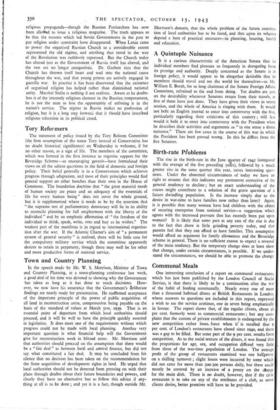Tory Reformers
The statement of policy issued by the Tory Reform Committee (the firm assumption of the name Tory instead of Conservative has no doubt historical significance) on Wednesday is welcome, if for no other reason, as a sign of life. The members of the committee, which was formed in the first instance to organise support for the Beveridge Scheme—an encouraging genesis—have formulated their views on all the salient questions in the field of domestic and foreign policy. Their belief generally is in a Conservatism which achieves progress through adaptation, and most of their principles would find general support on other benches than their own in the House of Commons. The foundation doctrine that " the great material needs of human society are peace and an adequacy of the essentials of life for every human being " does not cover the whole ground, but it is supplemented where it needs to be by the assertion that " the supreme test of parliamentary democracy will lie in its ability to reconcile planning for full employment with the liberty of the individual " and by an emphatic affirmation of " the freedom of the individual to think, speak, write, vote and buy as he wishes." The weakest part of the manifesto is in regard to international organisa- tion after the war. If the Atlantic Charter's aim of " a permanent system of general security " is realised, there will be little case for the compulsory military service which the committee apparently desires to retain in perpetuity, though there may well be for other and more productive forms of national service.


























 Previous page
Previous page